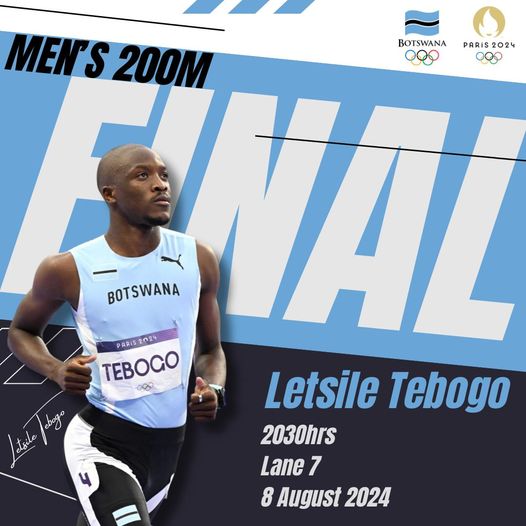Kutlo Motseta
15th August 2024
I was in the middle of a conversation with a local female hurdler, when she interrupted our conversation and said, “that boy runs so beautifully.” She was referring to a then young 16-year-old Letsile Tebogo, as he ran with his now globally recognizable elegant stride.
He was soft spoken then and still is, though he can now be counted amongst the likes of Lionel Messi, Ronaldo, Zinedane Zidane, Usain Bolt etc. in term of his raw athletic talent.
As an athlete and journalist, I have had the privilege to watch some of the local athletes start and fulfill their ambitions of becoming world stage athletes. It’s amazing that such amazing talent can come from such a small country which has a population of just over 2 million people. The country has scarce resources in comparison to power houses such as United States of America, whose performances are consumerate with their economic power.
There have been successes without sophisticated technology such as hyperbaric chamber machines (‘cold rooms’ – which cost in the region of P800 000), regular physiotherapy, well maintained tracks and other comforts such as consistent stipends that enable them to train unhindered.
Those that train at the University of Botswana stadium, which has been used and is still used by several current and future Olympians, including the internationally acclaimed and decorated Nigel Amos, Isaak Makwala, Amantle Montsho along with other internationally competitive athletes such as Christine Botlogetswe, Boitumelo Masilela and Tshepiso Maselela, will say that the bumpy surface more resembles an off-track car racing track than a running track.
Pound for pound, Botswana is probably the best performing 400m nation in the world. Given its size, the athletes performance exceeds that of more resourced countries.
Clearly the country has plenty of depth genetic resources that enable it perform at such a high standard. In addition to the above athletes, Bayapo Ndori, Anthony Pasela, Zibane Ngozi, Ditiro Nzamane, Colleen Tshipinari, Pako Seribe, Baboloki Thebe, Karabo Sibanda to name a few, are some of the athletes that have delivered for the country at the highest level.
They have recorded times below 46 seconds which is super elite performance or sub 50 seconds for women, which are times that enable these athletes to hold their own in any international race.
Local athlete, Sethunya Majama who is heading to the junior world championships between the 27th and 31st of August in Lima, Peru, said there is a lot that local athletic officials can do to enable them to become adequately prepared for international competitions.
When asked for a wish list of demands she said, “Yho! Supplements (Slowmag and vitamins for recovery), new shoes, new training, spikes bands, stop watches, starting blcoks and stipends.”
Majama has qualified for the 200m world junior championships and has never lost a local national 100m or 200m championship race since she started competing in form 1. She is now 18 years old and is in her first year out of high school. “My family supports me, if I don’t train they get worried,“ she said. She hopes to be at the next Olympic Games in Los Angles in the USA.
With support local athletes could perform better and enable the country to optimize its potential and grow its reputation as a global destination for the sprints. University of Botswana has just opened a High Sports Performance, with most local athletes used to travelling frequently to South Africa which has numerous High-Performance centers with state-of-the-art facilities for preparations for major events because sports science is a relatively new field in Botswana.









